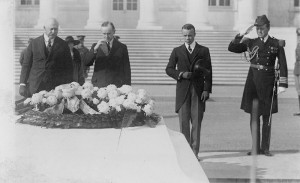What Matt said:
I sort of wish we called our November 11 observance Armistice Day like they do in other countries.
Something that I think is missing from American political culture is the thing that in Europe is taken to be the lesson of World War One, namely that a war can be bad for reasons other than it being lost. France and Britain were ultimately victorious in the war, but it was ruinous nonetheless. What was needed from the political leadership of the time was a way to avoid the war, not a way to win it. In America, though, evaluation of military endeavors is ruthlessly governed by considerations of efficacy. To lose a war, like in Vietnam, is a bad thing. But there seems to be a growing conventional wisdom that the surge has somehow redeemed Iraq and that the only thing we’re allowed to talk about with regard to Afghanistan is whether we can or will “win.”
 This is a tricky business because the qualities of leadership needed to win a war are almost diametrically opposed to the qualities needed to make good foreign policy decisions. On the one hand, winning wars requires convincing soldiers and citizens that they’re in a titanic struggle between good and evil. Ambivalent soldiers are never going to be effective war-fighters. And so militaries inculcate cultures of obedience and discipline, in which not only specific orders but also beliefs and attitudes flow down the chain of command. If the president of the United States decides that the mission of the military is to stop Naziism in Europe, communism in Asia, or terrorism in the Middle East, then rank-and-file soldiers are expected to wholeheartedly support the shared objective. And this bleeds over into civilian society. Millions of Americans put “support our troops” ribbons on their cars, and politicians accuse one another of failing to sufficiently support our troops.
This is a tricky business because the qualities of leadership needed to win a war are almost diametrically opposed to the qualities needed to make good foreign policy decisions. On the one hand, winning wars requires convincing soldiers and citizens that they’re in a titanic struggle between good and evil. Ambivalent soldiers are never going to be effective war-fighters. And so militaries inculcate cultures of obedience and discipline, in which not only specific orders but also beliefs and attitudes flow down the chain of command. If the president of the United States decides that the mission of the military is to stop Naziism in Europe, communism in Asia, or terrorism in the Middle East, then rank-and-file soldiers are expected to wholeheartedly support the shared objective. And this bleeds over into civilian society. Millions of Americans put “support our troops” ribbons on their cars, and politicians accuse one another of failing to sufficiently support our troops.
On the other hand, it’s tremendously important that we not get ourselves involved in any more unnecessary or counterproductive wars like the ones the United States entered in 1917, 1964, and 2003. And all the habits of thought that promote effective war-fighting make it harder to avoid getting into unnecessary wars in the first place. Pursuing a sane foreign policy requires precisely the kind of nuance and ambivalence that militaries try so hard to discourage within their ranks. It’s important that our policymakers be capable of drawing fine distinctions and to re-think old decisions in light of new evidence. They need to understand (for example) that Al Qaeda, Hamas, Hezbollah, the Baath party, the Iranian Mullahs, and the Taliban are independent entities with different and sometimes contradictory goals. It requires us to trade off different objectives, to realize that (for example) that we need to give up on fighting opium production in Afghanistan if we want to win the broader battle for the hearts and minds of the Afghan people. And above all, it requires us to remember that all wars, even “successful” ones, are tremendously costly. Yet once the build-up to war begins, pundits and politicians alike face tremendous pressures not to dwell on these kinds of problems for fear of demoralizing our troops and undermining the war effort.
In my view, the second objective of avoiding unnecessary is vastly more urgent for the contemporary United States. As the most powerful nation on earth, there are no serious threats to our territorial integrity. But we’ve squandered trillions of dollars, gotten thousands of Americans killed, and upended the lives of millions of foreigners in wars whose connection to national defense is tenuous at best.
The problem is that it’s hard to simultaneously honor the sacrifices of our veterans and have an honest discussion about whether those sacrifices were actually necessary. I have an uncle who served in Iraq, and I certainly wouldn’t want to tell him that the world would be better off had he not gone over there. But if it’s true, and I think it might be, we shouldn’t avoid saying so simply because it might hurt some soldiers’ feelings. Saving future soldiers’ lives is vastly more important than sparing past soldiers’ feelings.
More good stuff from John Quiggin and Jacob Levy.


